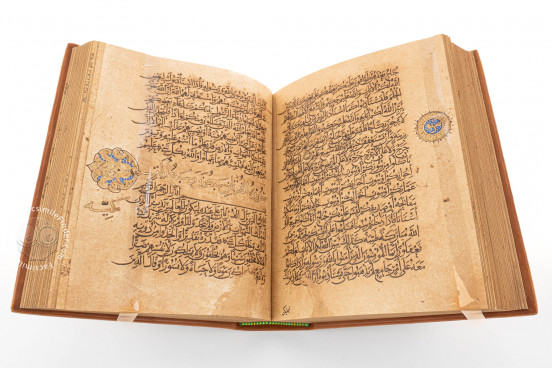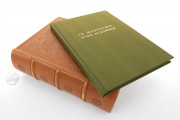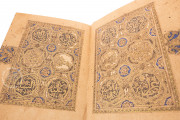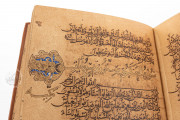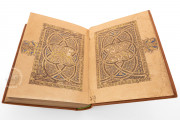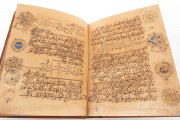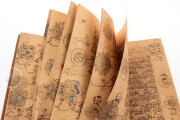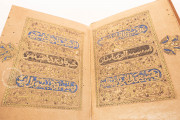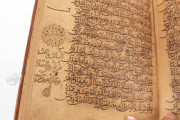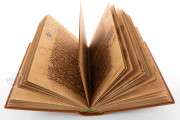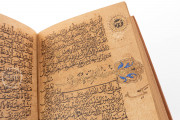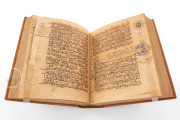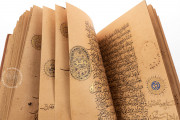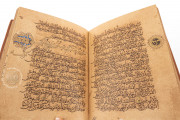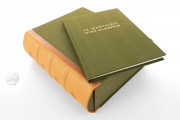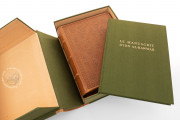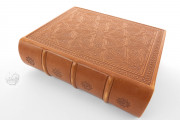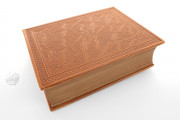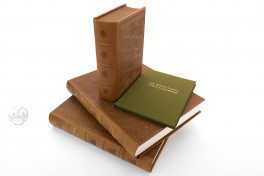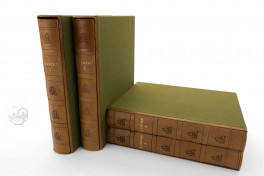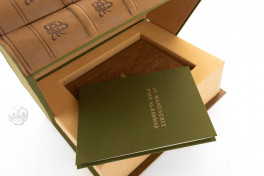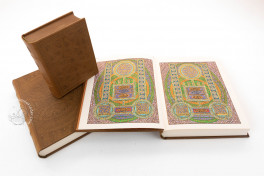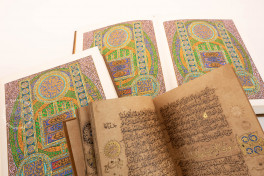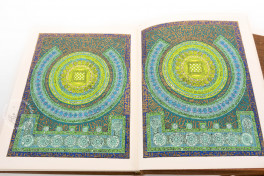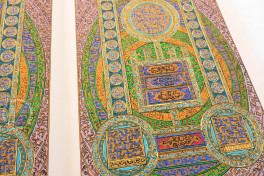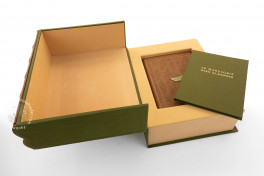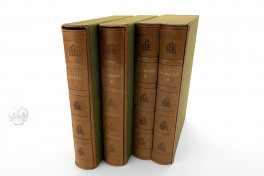The Koran of Ibn al-Bawwab is named for its scribe and illuminator, one of Islam's master calligraphers. He signed the manuscript, dating his work to the Islamic year 391 (1000 or 1001 CE) and localizing its production to Baghdad. The splendid book marks a turning point in the history of the manuscript Koran, being the earliest surviving dated Koran written on paper in Naskh script. It opens and closes with fully painted framed pages, six at the beginning and four at the end, featuring geometric and foliate patterns and interlace designs.
The Koran ("recitation") is the Islamic book of scripture, understood as the word of God revealed to the Prophet Muhammad by the archangel Gabriel. It comprises 114 suras (chapters), which vary in length from just a few verses to pages long.
Dazzling Framed Pages
The first two openings (pairs of facing pages) are fully painted, with geometric and spiraling floral and foliate motifs engulfing the text, written in gold outlined in black or unpainted paper outlined in gold (fols. 6v-7r) or gold with concentric black and white or white and black outlines (fols. 7v-8r). The text informs the reader that the Koran contains 77,460 words and 321,250 letters.
The next opening is purely ornamental, featuring a composition of intersecting circles and lotus flower motifs (fols. 8v-9r). This opening finds its counterpart at the end of the book, where a pair of ornamented pages is dominated by intersecting half-circles and torch-like motifs (fols. 284v-285r).
Firsts in Material and Style
Korans from the first centuries of Islam are written on parchment in the angular Kufic script, and they are commonly in landscape format (with pages wider than they are tall). The support of the Koran of Ibn al-Bawwab is polished paper—probably originally white and now a light sepia color—with pages taller than they are wide. The main script, Naskh, is the highly legible rounded script that came to replace Kufic as the preferred script for Korans.
A Famous Scribe
Ibn al-Bawwab, a nickname meaning "son of the doorman," is reported to have penned thirty-six Koran manuscripts, but the Koran in the Chester Beatty Library is the only one to come down to us. His contemporaries praised his writing, and the present manuscript attests to his finesse and skill in the art of calligraphy: his letters are both rigorously well-proportioned and gracefully flowing.
A Revealing Correction
Although he made very few errors, Ibn al-Bawwab corrected his manuscript as he wrote. The most telling mistake was remedied by covering a repeated verse with a painted ornamental band (bottom of fol. 40r). The style and technique of that band reveal that it, which must have been the work of the scribe, stems from the hand of the book's illuminator, thus securing the attribution of the illumination to Ibn al-Bawwab.
A Treasure of Chester Beatty Library
Khushraqmkhan Gujratt recorded his ownership of the volume in the eighteenth century (fol. 184r). The manuscript, as a part of the substantial library of the Irish American bibliophile A. Chester Beatty (1875-1968), was bequeathed to the Irish nation and is now housed in Dublin Castle. It is preserved in a modern European binding.
We have 2 facsimiles of the manuscript "Koran of Ibn al-Bawwab":
- Manuscript D'Ibn al-Bawwab facsimile edition published by Club du Livre, 1972-1981
- Koran des Ibn al-Bawwab facsimile edition published by Akademische Druck- u. Verlagsanstalt (ADEVA), 1981

